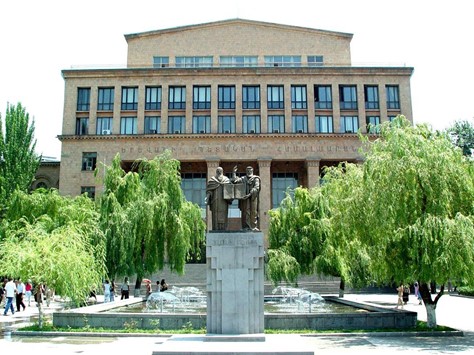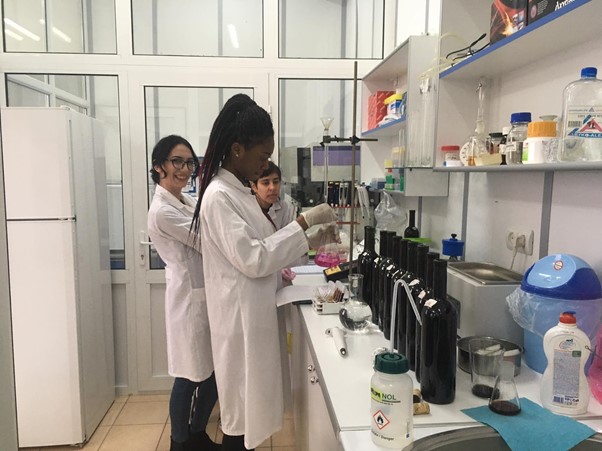

Alma Mater of Armenia, Yerevan State University (YSU), is a leading centre in the spheres of education, science and culture. Established in 1919, it has more than 110,000 graduates and nearly 18,000 students currently studying at 20 faculties. The educational and scientific activities are organized in more than 100 departments. YSU holds membership at various international associations, including EUA and BSUN. YSU has successful history of implementation of various Tempus, Erasmus Mundus and Erasmus+ projects devoted to university management, restructuring and developing new curricula and introduction of internal QA system. In 2015 the University has implemented a big project on establishment of Center of Excellence in Applied Biosciences based financed by the World Bank’s Competitive Innovations Fund. YSU’s new Center of Excellence in Applied Biosciences, which is operating as a part of Department of Ecology and Nature Protection, is focused on education, research and service-based development committed to launching next generation technologies in the areas of applied biosciences, natural resources sustainable use.
YSU Website (Faculty of Biology)

The International Hellenic University (IHU; Greek: Διεθνές Πανεπιστήμιο της Ελλάδος) was initially established in October 2005 and was based in Thessaloniki, Greece. The IHU was Greece’s first public university where programmes were taught exclusively in English comprised three (3) Schools which offered twenty-four (24) master programmes. In 2019, the International Hellenic University was re-established, and now comprises nine (9) Schools and thirty-three(33) Departments with campuses in Thessaloniki (Thermi and Sindos), Kavala, Serres, Drama, Katerini, Edessa, Kilkis, Didymoteicho. The two Schools (School of Humanities, Social Sciences and Economics and the School of Science and Technology) of the IHU belong to the University Center of International Programmes of Studies (UCIPS) of the International Hellenic University (IHU) offering programmes that are taught exclusively in English. The university is financed by the European Union and the Greek state.
In the position of the coordinator of the ABIONET project, one can find Associate Professor Dr. Thomas Thomidis (International Hellenic University, Department of Agriculture). His expertise includes, amongst other, Phytopathology, Plant and Crop Protection, Fungal Biology, Pest Managment, Horticulture etc and he has a plethora of publications under his name. Dr. Thomidis has participated in numerous ERASMUS+ programs, is thus equiped with all the necessary knowledge to help the ABIONET project come to fruition.
The aim of the master programme is to prepare students with the cross- disciplinary knowledge in the field of sustainable solutions of environmental problems, and sustainable use of natural resources, which includes application of biodiversity as a source of food, as well as management of ecosystems form the perspective of ensuring of food security.
Master programme in Applied Microbiology is established for training state of the art microbiologists which will gain not only theoretical but mostly practical skills which are required in the labor market in Armenia. In 2020 May first graduates joined different branches of economy in Armenia as microbiologists, regulatory specialists, scientists etc.
Master programmme in Applied Biosciences is developed in 2013 within TEMPUS MAPB project. The Master Programme in Applied Biosciences aims to produce graduates with fundamental knowledge and skills in the field of bioproducts technology science.


Food Safety Master Program has been launched at ANAU. A welcome meeting with the piloting students has taken place on 23 September. ANAU`s ABioNet team represented by Gayane Marmaryan, Garegin Hambardzumyan and Anna Dashtoyan as well as internal stakeholders Deputy Dean of Food Technology Department Anahit Saroyan, Director of Quality Assessment and Assurance Center Mariam Movsisyan, Professor of General Chemistry Chair Taira Papoyan, Lecturer of Biostatistics and Data Analysis module Gevorg Qeshishyan participated in the event.
All the details about the Program structure, perspectives, outcomes and key activities such as start-ups, webinars and trainings, mobility and resources contributing to the capacity building, have been presented and discussed. Students demonstrated interest and were proactive in discussions.
The ANAU staff welcomed all the piloting students and reiterated that they would do the utmost to ensure success during the whole duration of the Program.
Throughout the course of the summer a series of webinars took place within the framework of the ABIONET project providing information on several topics regarding the project, including scientific analyses of crop production, packaging, soils and pesticides, presentations of business plans, as well as overall information on the topic of the food industry.
The full series can be accessed via this YouTube playlist and detailed descriptions follow:
In her webinar “Biopolymer based packaging: applications for the food sector” (7/7/2020) Dr. Kiki Zinoviadou discusses the purpose and functions of packaging and different biomaterials. The production and composition and materials of bioplastics is analyzed, as well as their barrier, thermomechanical and mechanical properties. The webinar concludes with an exploration of the topic of edible packaging.
2. Food Sensory AnalysisDr. Kiki Zonoviadou presented a webinar (8/7/2020) on the topic of “Sensory Analysis of Food”. In her presentation she discussed briefly about the various factors that influence food preferences, had an in depth analysis of how our senses “interpret” food and how they are responsible for our preferences. Lastly, she explored the issue of tests in the food industry, including descriptions of different tests, such as difference tests, descriptive tests, and preference tests.
3. Liquid chromatography and spectrometry for the determination of pesticides in food samplesIn his webinar (9/7/2020) Prof. Manuel Sergi (University of Teramo, Faculty of Bioscience and Technologies for Food, Agriculture and Environment) analyses the topic of “Liquid chromatography and spectrometry for the determination of pesticides in food samples”. The screening and confirmatory methods are analyzed. In the webinar one can also find an in depth description of the 4-step process of “Sampling - Sample preparation - LC – MS analysis - Data managing”.
4. New food structuring agentsDr. Kiki Zinoviadou presented a webinar on the 13th of July, on the topic of “New food structuring agents”, within the context of the ABIONET project. After a brief introduction on the basics of rheology, dr. Zinoviadou addressed the types of emulsifiers and elaborated on the different types of emulsions (creaming, sedimentation etc.) as well as on the technicalities of such processes. Finally, Dr. Zinoviadou presented the usage of biopolymer structures and emulsions on food – grade delivery systems.
5. Rapid sensing of phenolic compounds in foodsOn the 14th of July 2020, Dario Compagnone presented his webinar on the topic of rapid sensing of phenolic compounds in foods. The presentation included thorough investigation on classical and alternative methods, such as MNPs with optical detection, electrochemical sensors and nanomaterials.
6. Cereal Bioactive Compounds: the case of fibersProfessor Maria Papageorigiou (IHU, Department of Food Technology) presented a webinar (27/08/2020) on the topic of “Cereal Bioactive Compounds: the case of fibers”. The prof. dealt with the different cereal species, their fiber contents, as well as wheat bioactives. There was in – depth analysis of dietary fiber and the various claims on it. There was also discussion on the impact of fiber on the human health, as well as related diseases. Finally, Prof. Papageorgiou dwelt on the topic of wholegrains.
7. Business Strategy: a practical methodology to develop a business modelProfessor Eduardo Luis Cardoso’s (Catholic University of Portugal – Faculty of Biotechnology) webinar (27/08/2020) within the context of the ABIONET project dealt with the topic of “Business Strategy”. The presentation included definitions of the term from the professor as well as experts on the field (G. Hamel, R. Komisar etc.), a description of the Business Model Canvas and finally some elaboration on the 9 Building Blocks of a Business Plan.
8. Food and Nutrition LabellingProf. Paola Pittia (Prof. in Food Science and Technology – University of Teramo) presented a webinar on the 28th of August on the topic of “Food and Nutrition Labelling”. The webinar included a brief history of labelling, a thorough analysis of EU and US regulations concerning the topic, as well as analysis on the more complex issues of allergens and processed goods.
9. Formulation Strategies to enhance Health and Nutritional Value of FoodsProf. Paola Pittia (Prof. in Food Science and Technology – University of Teramo) presented a webinar on the 31st of August on the topic of “Formulation Strategies to enhance Health and Nutritional Value of Foods”. Apart from an in depth analysis of the topic, the webinar also dealt with the drivers for innovation in the food sector, the negative impact of such processes and their evolution, elaborated on some dietary trends and made points about the issues concerning the quality and stability of modern day innovation.
10. Food Markets and TrendsThe webinar “Food Markets and Trends” conducted on the 2nd of September by Prof Eduardo Luis Cardoso (Catholic University of Portugal – Faculty of Biotechnology) focused on the food trends of 2020, with in – depth analysis of “mega – trends” (naturally functional, sustainability, fragmentation, snackification) and “key – trends”, namely digestive wellness, plant – based, good and bad carbs, sugar, meat reimagined etc.
11. Developing a business plan: a tool and a case studyIn his webinar (24/8/2020) “Developing a business plan: a tool and a case study” Prof. Eduardo Luis Cardoso (Catholic University of Portugal – Faculty of Biotechnology) discusses the definition of a business plan and its different elements.
12. Gluten Free Products. Challenges and Opportunities of new Ingredients and ProcessesThe webinar “Gluten Free Products. Challenges and Opportunities of new Ingredients and Processes” presented by prof. Maria Papageorgiou (IHU, Department of Food Technology) took place on Wednesday the 9th of September 2020 and focused on the topics of: celiac disease, what constitutes gluten, the legislation surrounding gluten free products and ingredients and processes regarding such products.
13. Case study: Learning Strategies for Innovation in new products for the agrofood and environmental systems”Professor Luis Cardoso’s (Catholic University of Portugal – Faculty of Biotechnology) webinar was presented on the 11th of September 2020. After a summary of the meaning of the term “agri – food sector”, the focus turned on project-based learning, more specifically a description of the process, as well as its benefits. Lastly, the case study of the “Innovation Track program and contest”, including the project’s objectives, structure, schedule and results, was analyzed.
14. Case study: Phytomanagement of metal(loid)s contaminated soils“Case study: Phytomanagement of metal(loid)s contaminated soils” was presented on September 14, 2020, by Helena Moreira (Catholic University of Portugal – Faculty of Biotechnology). After a brief introduction to the thematic, which included the topics of soil pollution, phytotechnologies, phytomanagement and bioaugmentation, the webinar focused on greenhouse studies (more specifically: the effects of soil sterilization and metal spiking in PGPR selection) and field studies (i.e. bionocula in TE contaminated sites)
15. Microbial – assisted crop production in agriculture – Case studies“Microbial – assisted crop production in agriculture – Case studies” was the topic of the webinar conducted on the 15th of September by Sofia Pereira (Catholic University of Portugal – Faculty of Biotechnology). During the webinar Ms. Pereira discussed the impact of abiotic stress on crop production, ways to increase crop production and beneficial soil microorganisms. In addition, she presented case studies of the effects of bioinoculants on the amelioration of plant growth.